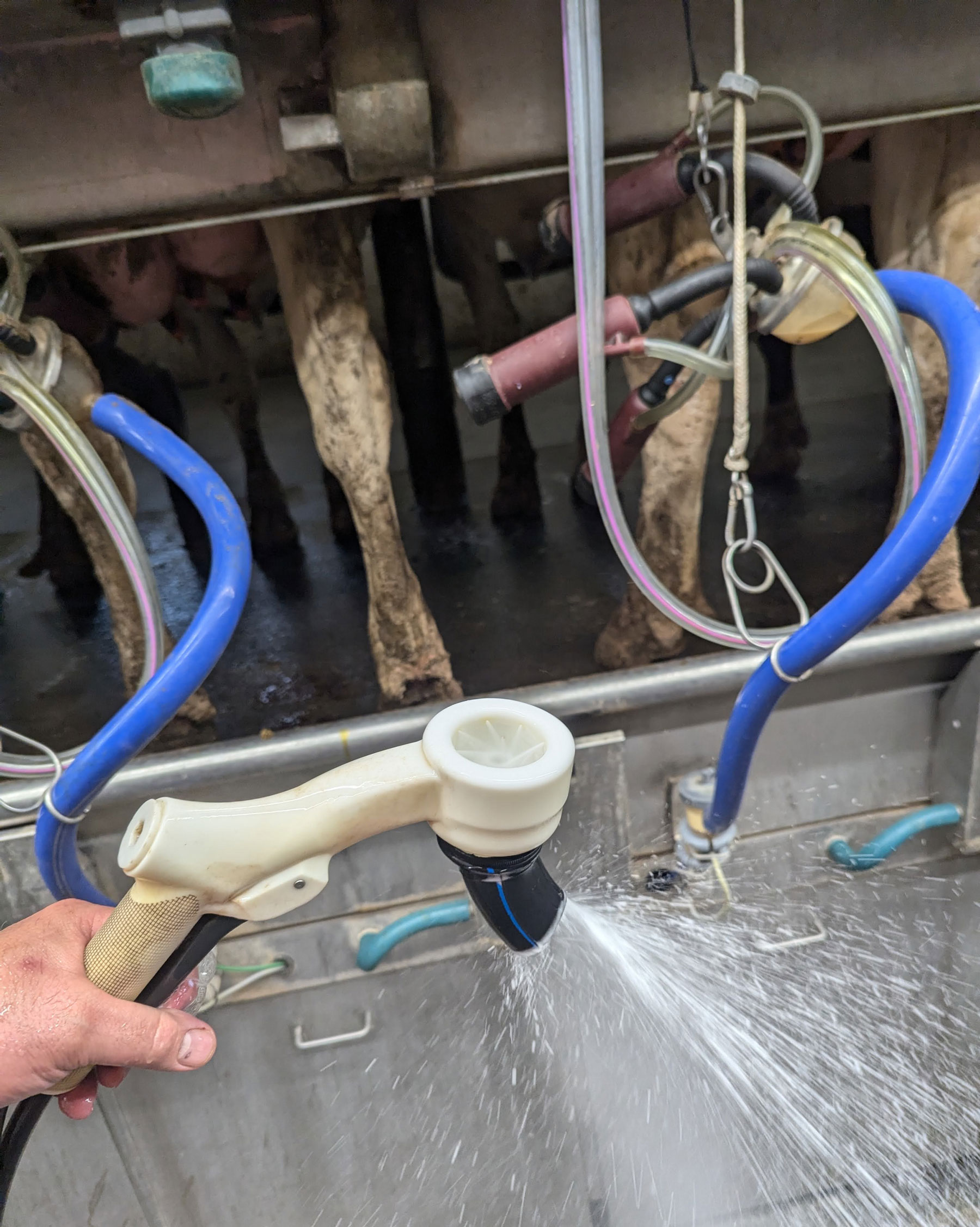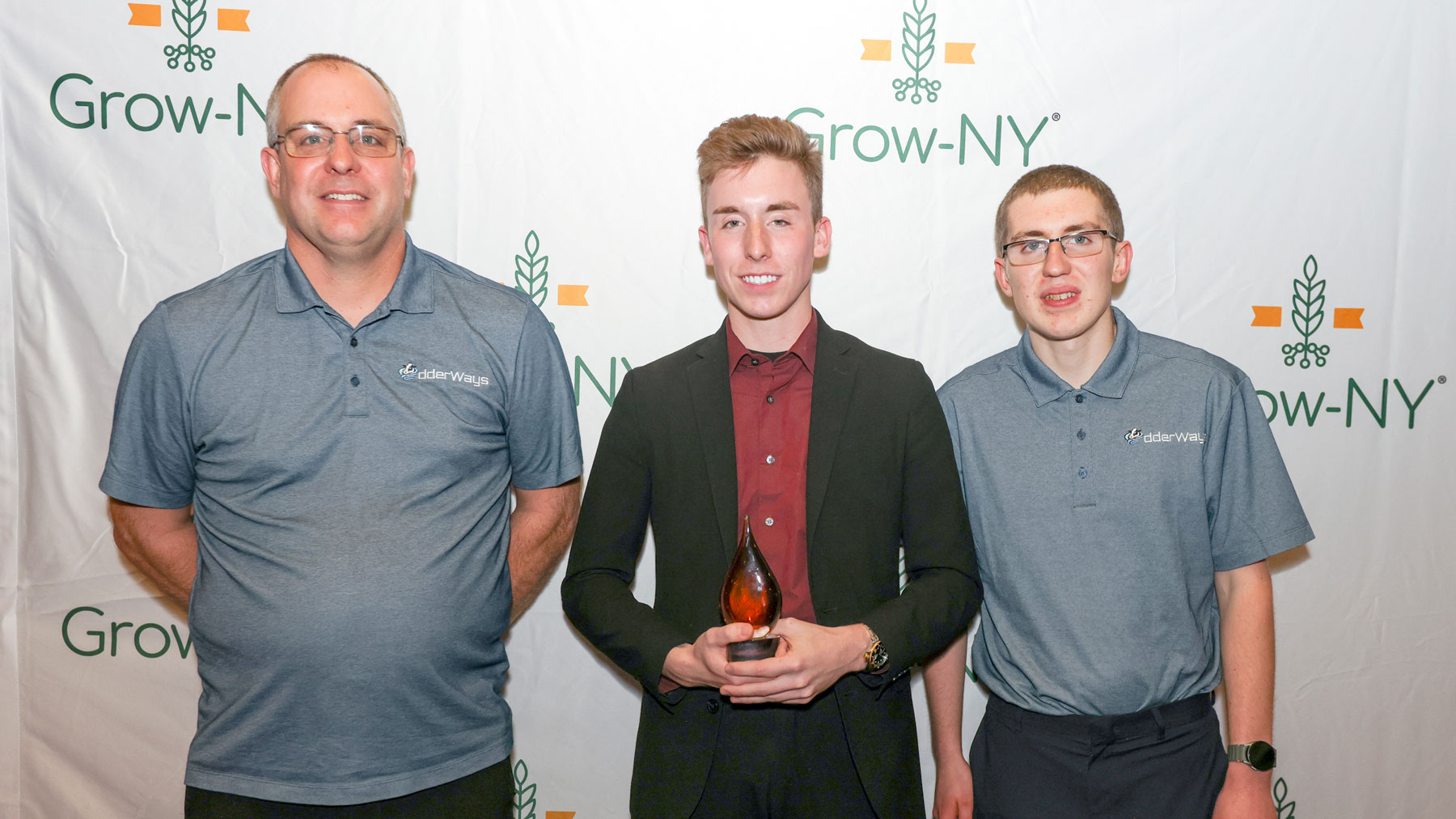Jody Neal doesn’t know if his two sons will come home to the dairy farm. But that doesn’t mean he won’t let them “tinker around” to find their own passions.
Now, the fruits of their tinkering have paid off. Jody and his two sons — Zachary and Jayden — stood side by side on stage as one of eight winners in this year’s Grow-NY startup business competition.
Their company, UdderWays, beat out 312 applicants from 50 countries for one of only two $500,000 awards. They developed a vortex for cow teat cleaning and faster milk letdown.
“The idea came out of the fact that we were trying to use a new pre-dip sanitizer, but existing tools couldn’t handle using that sanitizer. So, we decided to make something new,” Zachary says. “We established UdderWays as a vessel to take the product out to market.”
See the vortex in action here:
The story of how they developed it started when Zachary, a student at Roberts Wesleyan University, saw a 3D printer advertised in a magazine. A 3D printer allows the creation of a physical object from a three-dimensional digital model.
They aren’t cheap machines; some printers cost thousands of dollars. So, Zachary got friends and family to donate money and become “partners” to buy the machine.
Soon after, he, his father and brother got to work, designing a vortex that creates an oscillation that swings the cow teat around to not only clean it, but also stimulate it.
“My father came up with designs, and my brother, Jayden, created it using a 3D printer,” Zachary says. “He would 3D print it in the garage. In the same afternoon, he would bring it over for us to look at.”
They went through hundreds of designs and prototypes, ultimately settling on a vortex that they were able to get a utility patent on. After nine years in development, it’s now being tested on six farms, representing about 50,000 cows.
On his own farm — Orleans Poverty Hill Farm, a 600-cow dairy in Albion, N.Y. — Zachary says milk output is 25% faster since switching over to the vortex.
He says the machines can be particularly useful on dairies with rotary parlors.
"What we're doing is we're increasing that stimulation so cows let out milk faster, and the rotaries can be increased in speed and gets in and out faster," Zachary says.

What are they planning to do with the $500,000? Zachary says the plan is to work with companies that can possibly help develop the machines further and manufacture them here in the U.S. The current machines are made in China.
The Grow-NY competition rules stipulate that they must operate in the region for at least a year and provide a small equity stake in the company to Cornell University, which will use the money to fund future food and ag entrepreneurship programming.
The farm goes back to the 1950s when Jody’s grandfather bought it and milked 16 cows. Jody attended Cornell University to become a veterinarian, but he came back to the farm around 1996. It has slowly expanded, first to 400 head in the early 2000s and then 500 head in 2010. The farm currently milks 600 cows.
Jayden, who is a senior at Rochester Institute of Technology, has helped the farm become more automated, writing apps so cows can be monitored remotely, designing a wand to read RFID tags and even coming up with a system to monitor field tiles.
“It’s a way to see if tiling is working. Apparently, he came up with a low-cost way to do it, and he’s trying to establish a business out of that,” Jody says. “I’ve allowed them to learn on the farm, take their interests on the farm, and try to utilize it and grow. I’m proud of them.”
For Zachary, the “sales guy,” nothing beats working with his dad and brother on the project.
"It's really been amazing working with my family through this whole process," he says.

Grow-NY winners
The $1 million grand prize winner was Unibaio, which offers naturally derived particles that trap the active ingredients of pesticides and fertilizers, enabling them to penetrate plants more efficiently.
Other winners include:
$500,000, PureNanoTech, Parsippany, N.J. Creates a nanobubble irrigation solution to maximize irrigation performance and optimize energy usage in the agriculture, pond and lake restoration, wastewater treatment, and disinfection industries.
$250,000, Clean Crop Technologies, Holyoke, Mass. Combines electricity and food-grade gases to remove pathogens from seeds before they are planted, increasing yields, reducing waste and improving food safety without preservatives.
$250,000, ClearLeaf, San José, Costa Rica. Offers safe fungicides and bactericides to protect soil and crops from a wide range of pre- and postharvest pathogens without harming the environment.
$250,000, For Bitter, For Worse, Portland, Ore. A distillery that uses certified organic, locally farmed ingredients to create a healthier, more inclusive culture with their non-alcoholic cocktails.
$250,000, Zordi, Oakfield, N.Y. Builds autonomous greenhouses with robots and artificial intelligence to make delicious, high-quality produce available anywhere.
The public also participated in the competition by voting for the “Wegmans Audience Choice” award, which went to Bialtec of Delft, Netherlands, earning them $10,000 sponsored by Wegmans.
Sixth year of competition
The competition awarded $3 million to seven of the 20 finalists participating in the business development accelerator.
The competition is managed by Cornell University’s Center for Regional Economic Advancement.